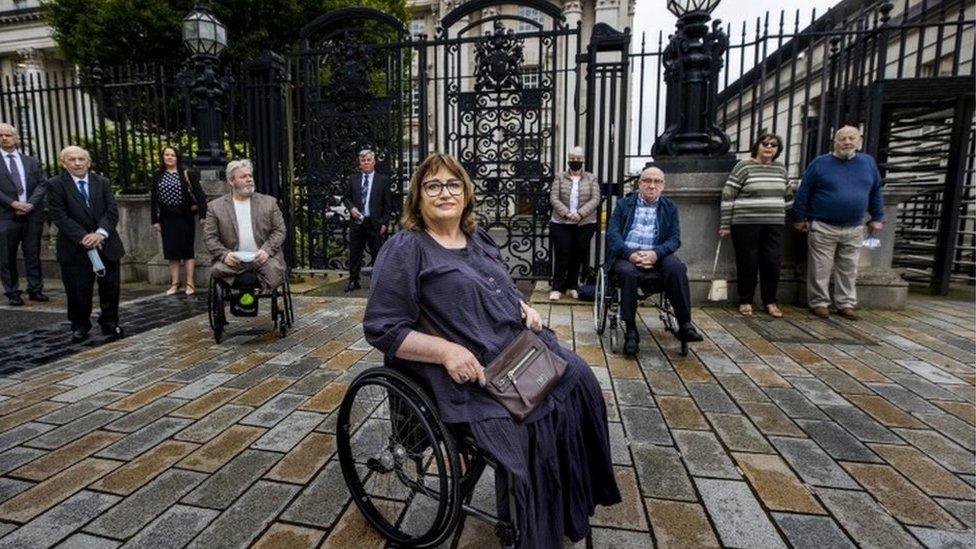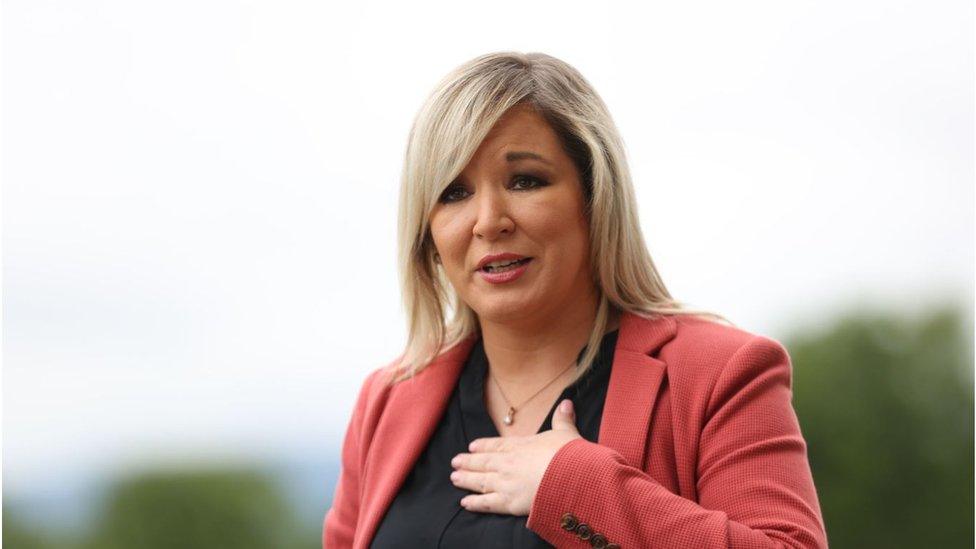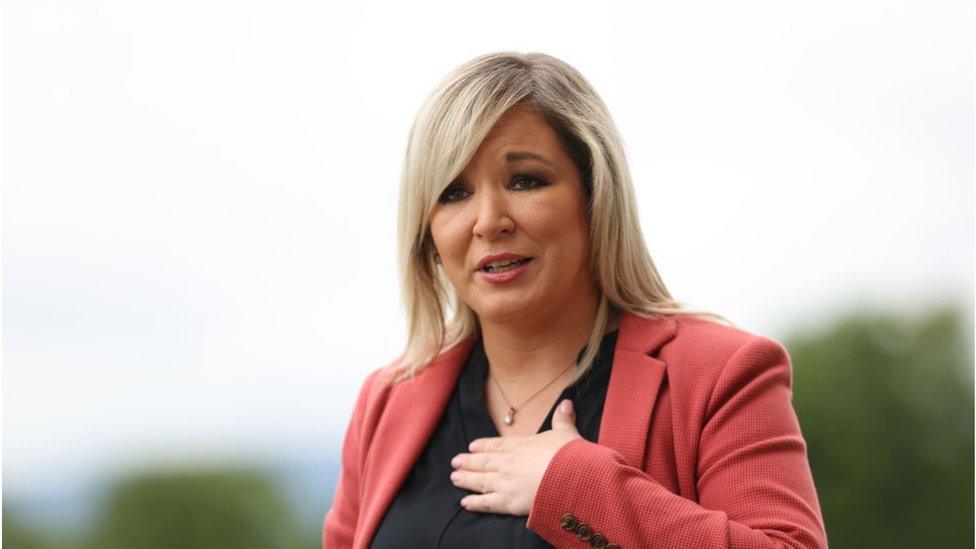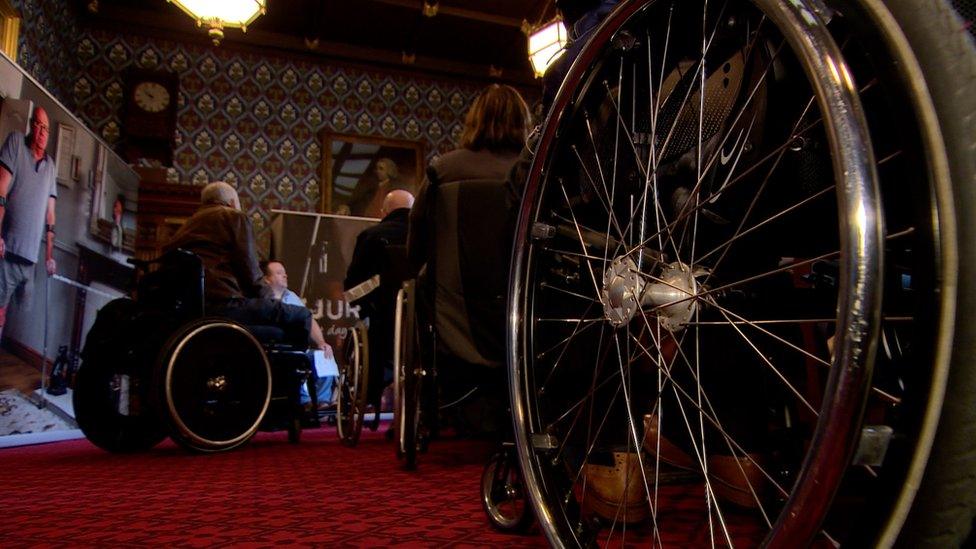Troubles pensions could cost up to £800m - Naomi Long
- Published

Legal challenges by two victims - including Jennifer McNern, pictured - were brought over the delay to the compensation scheme
A compensation scheme for injured Troubles victims could cost up to £800m, the justice minister has said.
Last week, a judge ruled that the NI Executive Office was acting unlawfully in delaying Troubles pensions.
Naomi Long said the scheme could not be funded entirely by the Northern Ireland government and that additional funding from Westminster would be needed.
She said the scheme might not be delivered for 12-18 months.
It had originally been estimated to cost about £100m.
On Monday, the NI Executive Office (TEO) designated the Department of Justice (DoJ) to administer the scheme.
Speaking on the BBC's Good Morning Ulster programme, Mrs Long said "it is not clearer where the money is coming from yet" but it was "clear in my mind where it should come from".
"We're talking anything up to £800m so we're not talking about small amounts of money," she added.
"I will get my job done and then it's for others to step up and deliver, and fund the scheme.
"The judgement was very clear last week that the money needs to be given in order for us to make the structural decisions, and that has to be allocated by the Executive Office."
In a tweet following her comments, Mrs Long said £800m was "the upper end estimate: the actual figures will be clearer once applications open and start to be processed".
Allow X content?
This article contains content provided by X. We ask for your permission before anything is loaded, as they may be using cookies and other technologies. You may want to read X’s cookie policy, external and privacy policy, external before accepting. To view this content choose ‘accept and continue’.

Speaking later on Radio Ulster's The Nolan Show, Mrs Long explained the cost would be higher than initially expected after the scheme was extended to include those who have been psychologically injured.
She added that figure of £800m was a "worst-case scenario".
"Those numbers are very uncertain unlike physical injuries," she said.
"We think the figures of those psychologically injured could be between 2,500 and 7,000 but we can't tell what the overlap will be."
Sandra Peake, of the Wave Trauma Centre, said it did not recognise the £800m figure.
"The majority of those who will qualify were injured during the 1970s and 1980s," she said.
"Given their age profile and those of their carers, usually spouses of similar age, there will be few who will still be receiving a pension in 30 years time."
Legal challenge
The victims' payments were approved by Westminster in January.
They will give regular payments to people seriously injured, but have been long delayed by arguments over the definition of a Troubles victim.
A legal challenge to the delay was brought to the High Court in Belfast by two victims.
Mrs Long said it was "regrettable" that victims of the Troubles were forced to go to court over the delay.
Mr Justice McAlinden ruled the Executive Office was deliberately stymieing the commencement of payouts in order to pressurise the government into funding it and, in Deputy First Minister Michelle O'Neill's case, getting the eligibility criteria changed.

Michelle O'Neill has voiced concerns about eligibility for scheme
Ms O'Neill had declined to progress the scheme by refusing to allow the Executive Office - which she runs jointly with First Minister Arlene Foster - to nominate a department to administer the pension payments.
On Monday, the executive announced that the Department of Justice was being asked to take forward the scheme.
The Troubles claimed more than 3,500 lives and the Northern Ireland Office has estimated another 40,000 people were injured.
The scheme aims to provide pension-like payments to victims of the Troubles, every year for the rest of their lives, with payments ranging from £2,000 to £10,000.
Victims will be eligible to apply if they were injured in an incident at any point between 1 January 1966 and 12 April 2010, the date that responsibility for policing and justice was devolved to Stormont.
- Published21 August 2020

- Published17 August 2020

- Published14 August 2020
